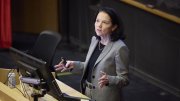During the past month and a half, as the COVID-19 pandemic unfolded in the United States and mounting data showed its disproportionate effect on African Americans and other minorities, Evelynn Hammonds, Rosenkrantz professor of the history of science and professor in African and African American studies, has been holding weekly video-chat discussions on race and epidemics. With scholars of history, medicine, and public health, she has dissected the flu pandemic of 1918, smallpox in the 1860s, and Philadelphia’s yellow fever outbreak in 1793. She has talked about coronavirus and prisons, and persistent health disparities in African American communities. The discussion series is sponsored by the Hutchins Center for African and African American Research, where Hammonds is director of the Project for the Study of Race & Gender in Science & Medicine.
This Thursday, Hammonds’s guest was Kolokotrones University Professor Paul Farmer, co-founder of the global health nonprofit Partners In Health. Hammonds led off with some sobering statistics: African Americans make up between 27 and 38 percent of the populations of South Carolina, Mississippi, Georgia, and Louisiana—but account for 52 to 58 percent of coronavirus deaths there. And data from 38 states and Washington, D.C., she said, suggest that if black Americans had died from COVID-19 at the same rate as white Americans, about 9,000 of the nearly 15,000 African Americans lost in those states would still be alive.
Then she asked Farmer a deceptively simple question: why are African Americans bearing the worst of this disease?
“The most heartbreaking part of a pandemic full of heartbreaks,” Farmer said, noting not only the higher risks of exposure for African-American communities, but also the profound differences in outcomes for those who are infected—differences that point to deeply ingrained inequalities in access to insurance and medical care and in underlying health conditions like obesity and diabetes. Drawing on his experience with other epidemics—HIV, tuberculosis, cholera, Zika, Ebola—Farmer stressed the importance of community-health workers. They are, he said, the “natural living links” between households and hospitals, households and clinics, and clinics and hospitals. “Even before we start talking about contact tracing, the community-health function is primary.” Too often, he said, governments fail to fund community-health workers because they are not considered cost-effective. But the link they provide is critical and irreplaceable. The United States needs hundreds of thousands more. “There are 350 local public-health offices in the state of Massachusetts,” Farmer said. “That sounds like a lot, but they're overwhelmed.”
He added that health-care problems in communities like Chelsea—a hard-hit Boston suburb with a mostly Latino population, many of whom work essential jobs that carry a high risk of exposure—are inextricably tied to a larger web of social problems: “difficulty because of sudden unemployment, difficulty paying the rent, difficulty looking out for grandma, difficulty with childcare.”
During the hourlong conversation, Hammonds and Farmer talked about Jim Crow, colonial legacies, and the similarities of COVID-19 to disease outbreaks in places like Haiti, Malawi, and Siberia. They talked about how to build better and more humane institutions, how to engage people in social-justice healthcare work, and how racial health disparities in the United States remain frustratingly unchanged from 20 years ago.
They also discussed, in hopeful terms, how the pandemic might create a mandate for wider access to medical care by forcing a reckoning with deep structural inequalities. During the Q&A, one listener asked for Farmer’s thoughts on universal access to whatever vaccine or antiviral treatments eventually emerge, and Farmer smiled faintly. “We've been clamoring for this for decades,” he said, “whether it was an anti-TB medication or a diuretic that's effective and cheap.…And we have a public clamor for widespread access to a [coronavirus] vaccine, not based on the ability to pay. I think we'll have demonstrations in the streets if necessary, and I think that'll happen all over the world.”
Another listener asked whether that movement would open a gateway for universal health care in the United States. Maybe, Hammonds said. “If this is not a clear example of a system that needs to change, I don't know what could possibly be worse—or better—for people to see.…Because people are suffering right now in ways that—it's not an abstract conversation anymore.”
Later, Farmer added, “Keep banging down doors, you know? If they’re doors, they were built by fellow humans and they can be dismantled.”









